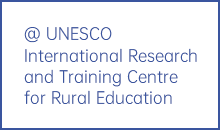“Assuring the right to quality education throughout life" is one of the two foundational principles needed to create a new social contract mentioned in the report Reimagining Our Futures Together — A new social contract for education recently, released by UNESCO.
In this context, the third dialogue of the UNESCO INRULED’s Education Open Talks set the theme as "Looking at Rural Education and Training for Sustainable Development in Rural Areas from a Lifelong Learning Perspective", focusing on the two keywords of "lifelong" and "quality".
UNESCO INRULED's Chief Expert, Professor Li Xingzhou from Beijing Normal University, hosted the talk, and invited three guest speakers: Professor Xu Li from Hebei Normal University, Associate Professor Yuan Dayong from Beijing Foreign Studies University, and Ms. Grace Hulda from Cameroon, a Ph.D. student from Beijing Normal University, to discuss the following five questions:
1. What is a lifelong education system? What significance does the construction of this system have for rural development, and what new requirements does it impose on rural education?
2. How does lifelong learning in rural areas promote sustainable development of rural areas in China? What inspiration and ideas can China's experience in lifelong learning in rural areas provide to the world?
3. How is the education system in Cameroon, what are the problems, and what strategies or paths does Cameroon have in advancing its lifelong education system?
4. For the next 30 years, what changes will take place in rural education? What can we do to turn this blueprint into reality?
5. How can education in underdeveloped areas experience faster and better development? How can rural education and training promote sustainable development by supporting the development of talents in rural areas?
1. What is a lifelong education system? What significance does the construction of this system have for rural development, and what new requirements does it impose on rural education?
We often consider lifelong education adult education, or on-campus education plus other types of off-campus education, which is a theoretical misinterpretation, but it is also an inevitable stage. Without the development of adult education, it is difficult to talk about lifelong education, but adult education or on-campus plus off-campus education is by no means lifelong education. For more than half a century, people's understanding has not reached an agreement in the original realm of lifelong education. Various theoretical misunderstandings have affected the advancement of effective practice. If this is an unavoidable process, then lifelong education has entered a critical stage facing a breakthrough at the theoretical level. This is Professor Xu Li's view on lifelong education based on the new report released by UNESCO.
As for the relationship between lifelong education and lifelong learning, Professor Xu Li mentioned that the construction of lifelong education theory is based on the full development of lifelong learning. In addition, she emphasised that lifelong education should go beyond the various humanist claims confined to anthropocentrism, and turn to the perspective of the entire biosphere, using "ecological justice" as the foundation of the theoretical framework of lifelong education. Lifelong education is by no means simply a lifelong process in the shaping sense. It is a process of upgrading the system from inside to outside, an integrated philosophical concept, and a new social form coexisting with the world. Guided by this brand-new framework, we need to discuss what, how, and where to learn. This is an unprecedented and profound revolution in the learning paradigm and an educational attempt to cultivate people with sound minds.
The construction of a lifelong education system under this concept is of great significance to the leap-forward development of rural education in the new era and provides an opportunity and possibility for the integration of urban and rural education. Thus, rural education will be transformed into "a vibrant world synchronised with rural revitalisation". Every person and every creature can make contributions in the process of creating a diverse world. Rural education space is no longer synonymous with still or loneliness, and rural students no longer only yearn for cities.
Associate Professor Yuan Dayong mentioned that, based on education referred to as our common interest in the UNESCO Rethinking Education report in 2015, and the social contract concept in the latest UNESCO Futures of Education report, the starting point of the contract is the vision of the public purpose of education, which is based on the fundamental principles of inclusiveness, fairness, cooperation, solidarity, collective responsibility, and interconnection. It is composed of the basic and organizational principles of building an education system and the work needed to establish, maintain and update the education system. Lifelong education is a kind of "public meaning". The basic concept of contract is framed by many rigid laws and policies, but we cannot ignore that social contracts also have soft sides, such as culture and social habits. Lifelong learning is a social culture that affects everyone's development. It is not only public interest but also has a public meaning.
2. How does lifelong learning in rural areas promote the sustainable development of rural areas in China? What inspiration and ideas can China's experience provide for lifelong learning in rural areas to the world?
Beijing - Learning Cities and Learning Villages
Associate Professor Yuan Dayong shared his experience of lifelong education and rural education practice in Beijing from three aspects: "When conditions are ripe, success will come", "International vision and local action" and "Based on 2030, looking forward to 2050".
He mentioned that many educational innovations are carried out in the context of country-wide reform. The development of education is affected by social and economic development. All educational activities must adapt to and serve social development. This is the external law of educational development. After the economy has reached a certain stage, we will consider the issue of social imbalance. This is a natural process. In the initial stage of the development of lifelong education, more attention is paid to the adult group, while true lifelong education is the concept of "anyone, anytime and anywhere". When economic and social development can support balanced integration of education, it will have the ability to design education projects for each group at different stages of development, so this is a natural process.
The second aspect is international vision and local action. Internationally, education for sustainable development, lifelong education, and lifelong learning have been used more frequently. China’s traditional view is "It is never too old to learn". How to integrate internationally popular discourse into China's educational practice and achieve the integration of the length, depth and breadth of learning requires the joint thinking and design of educational policy researchers and practitioners.
Third, the new report is facing towards 2050. Therefore, it is necessary to have a common vision of forward-looking. It is necessary to use the concept of lifelong learning to lead future development. Lifelong learning can stimulate the great potential of the country, society, and individuals. When designing the 2050 education policy, we should put lifelong learning as a core concept of the education agenda.
Beijing-Tianjin-Hebei Cooperation
In recent years, Professor Xu Li has devoted herself to the development and research of Beijing-Tianjin-Hebei collaboration and Xiong’an New Area. She mentioned that after comparatively studying several urban agglomerations, such as the Yangtze River Delta and the Guangdong-Hong Kong-Macao Greater Bay Area, she has found a pattern. No matter whether it is economic or educational development, a coordinated regional promotion has two effects: agglomeration and radiation. When the gap is too large, coordination will go to the opposite side. Instead, it will gather the surrounding high-quality resources to the best place. At present, a possible potential role of the Xiong'an New Area, which is boosting the coordination of Beijing-Tianjin-Hebei, is to balance this gap. Therefore, the education problem faced by the Xiong'an New District also requires thinking and exploring the construction of a lifelong education system under a brand-new framework.
At the same time, she mentioned that our original idea of the integration of urban and rural education was, for example, that we provided great teachers and high-quality courses to the countryside. Later, she discovered that when the quality of education in rural areas is more equivalent to that in cities, more people are leaving the countryside. How to integrate rural education with rural revitalisation? She proposed to rebuild a new paradigm of education, that is, contextualised education, so that education can be embedded in this beautiful rural landscape. In this regard, she introduced the "Life · Practice" education attempt under the vision of lifelong learning currently being implemented in Xiong’an New District. The implementation method of "Life · Practice" education is "integrated", that is, through subject curriculum and life curriculum, including school, family, society and nature, etc. A variety of ways are integrated to complete the value shaping, capability building, and knowledge transfer. This is the theoretical creation of Mr. Zhou Hongyu's innovative development of "Life Pedagogy". Tao Xingzhi's Life Pedagogy is the theoretical origin, which is consistent with the new concept of integrating into the world.
3. How is the education system in Cameroon, what are the challenges, and what strategies or paths does Cameroon have in advancing its lifelong education system?
Ms. Grace Hulda from Cameroon said that lifelong learning is a relatively unfamiliar concept in her country. She quoted a local scholar “Lifelong learning refers to continuous learning activities throughout life, to improve the knowledge and skills of individuals, citizens and the society”.
From her perspective, she shared and discussed some problems and possible improvements to Cameroon's education system. A major feature of the local education system is that it is divided into two major regions, Anglophone and Francophone. It is because the education systems in the two regions are not interoperable, the content of the courses and the language of instruction are also completely different. In addition, another dilemma faced by Cameroonian education is the lack of localised curriculum content, and the textbooks used do not conform to the actual local conditions. Cameroon is a former French colony, so most of the textbooks used in Francophone are originally from France. Ms. Hulda expressed her concern about this. The ultimate goal of lifelong learning is to promote individual development and to promote social development through individual development. However, if children do not understand the basic situation of their ethnicities or nation, there is no way of promoting the development of the country, not to mention to promote the development of the world.
In this conversation, she also shared a highlight of Cameroon's education system. For residents of Cameroon, there is no huge difference between secondary schools and technical schools. In fact, many people prefer technical schools because of higher teaching quality and better employment.
4. For the next 30 years, what changes will take place in rural education? What can we do to turn this blueprint into reality?
Associate Professor Yuan Dayong viewed this issue from three aspects: concept, strategy and prospect.
He emphasised the need to turn the concept of lifelong education and lifelong learning into an achievable concept at a nation’s strategic level. From the perspective of rural education, it is necessary to shift from learning cities, which were previously built, to learning villages. In addition, we should promote ecological civilisation education and education for sustainable development in rural areas.
Secondly, at the strategic level, different agencies need to cooperate. The first is to strengthen the role of the government as a leader. We should start from the concept of lifelong education, understand the actual needs of all parties, and provide support in terms of policies and financial expenses. The second is to emphasise the role of the coordinator among different institutions. Lifelong education should be provided for anyone, anytime, and anywhere. The third is the demanders. As learners, we are all aware that we should keep learning. We need to transform our personal needs into actual needs that can be recognised by society, the government, and related institutions. We must emphasise more on the protection of the individual's right to lifelong learning.
The third aspect is looking forward to 2050. Professor Yuan proposed that we should build a culture of lifelong learning. The realisation of lifelong education requires the close cooperation of all our people, institutions, and departments to make lifelong learning an important culture in people's social life.
Professor Xu Li talked about the relationship between human beings and the world from the perspective of the countryside and the city. She said that if we change the human-centred concept and turn the duality of subject and object into unity and promote mutual understanding, we can transform cities. The industrialised elements in the city are linked with the artistic beauty of the rural natural pastoral scenery. In this regard, she believed the importance of digging out local elements, such as rethinking the significance of the new era of people’s educator Tao Xingzhi’s "Life Pedagogy".
In Ms. Grace Hulda’s imagination, Africa would be highly developed in the future. She believed that African countries should continuously improve human capital, accelerate economic growth, enhance core competitiveness, and promote inclusive development.
5. How can education in underdeveloped areas experience faster and better development? How can rural education and training promote local sustainable development by promoting the cultivation of talents in rural areas?
Professor Li Xingzhou concluded that there was still a gap between urban and rural areas in most countries in the world. He believed that in the process of educational reform and development in less developed areas, a new development concept must be established, that is, to get rid of the thinking of industrial society development and turn to sustainable development. Leapfrog development, that is, does not destroy the original overall structure, actively avoids some contradictions in the development, reduces the tortuous nature of the development, and realises a leap in the speed of development; it also emphasises informatisation and digital development, because the digital age can break the boundaries of space and fully endow everyone with the greatest degree of development.
From a historical point of view, while the four technological revolutions experienced by human society have brought tremendous achievements to society, they have profoundly shaped the global social pattern and pattern distribution. The time interval between different technological revolutions is shortening, which has a negative impact on the social pattern. The influence is intensifying, and it has also changed the individual’s cognition and perception of society’s thinking towards the entire world.
The second is the field view, which needs to transcend the dual structure of urban and rural areas. This is also a problem that has long constrained rural development in the process of human development. By leaping over development and using digital revolution to bridge the gap between urban and rural development, we can achieve the integration of urban and rural areas.
The third is the view of cognition. We must recognise the changes that technology has brought to human cognition and thinking, learn to use technology, and ultimately be able to control technology, through the intermediary and application of technology, to achieve the development of individuals and society.
The fourth is the ecological concept. At the individual level, it is necessary to promote the integration of human and technical skills, help rural populations master specific technical skills, and achieve leapfrog development of individual skills. From a social perspective, it is necessary to promote the formation of a skilled society and lay a good foundation for the leap-forward development of technical skills in rural society.
Looking forward to the future, starting from the new development concept, through the continuous advancement and realisation of lifelong education and lifelong learning, we have reasons to believe that the villages will become more beautiful in the future.













